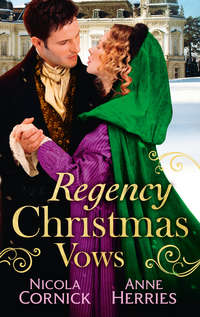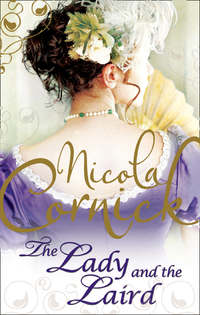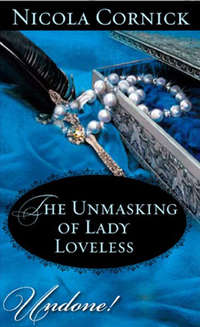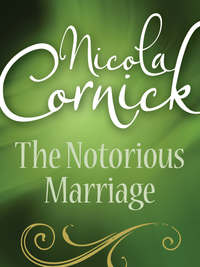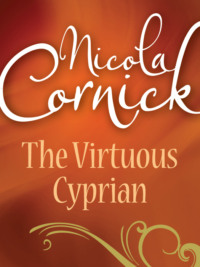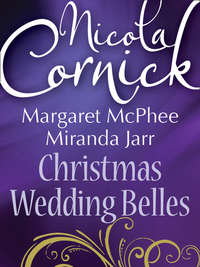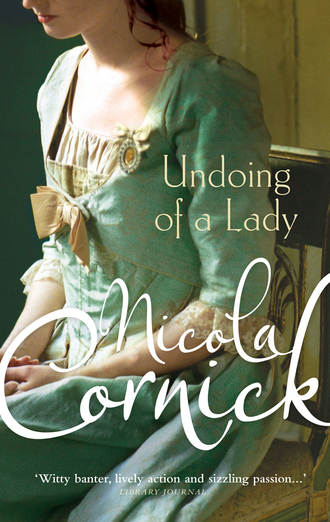
Полная версия
Undoing of a Lady
He bent to retrieve the parcel of blue muslin that was resting in the gutter. Goodness only knew why Lizzie had bought it. She was the least accomplished woman in the world with a needle and had always scorned embroidery and dressmaking.
Nat felt a pang somewhere deep in his chest. He knew Lizzie so well. They had been friends for years. He cared for her. It hurt that she used to run to him for help when she was in trouble and now she was running from him. He did not even understand why she was running though he imagined that it must be because she was so shocked and scared and mortified by what had happened that she simply could not face him. But he could put all to rights if only she would let him. The first step was taken. He was free of the engagement to Flora, free to marry Lizzie instead. He could give her the protection of his name and he could claim her fortune in place of the one he had lost.
If only he could make her stay still long enough to hear his proposal.
If only she accepted it.
With Lizzie one never knew.
He twisted the brown paper parcel in his hands and heard the covering rip. He could deliver it to Fortune Hall in person and demand that Lizzie see him. Except that she would probably climb over the roof and run away into the woods again sooner than speak with him.
For a moment he toyed with the idea of going to one of Lizzie’s friends, to Laura Anstruther or Alice Vickery, and asking for their help. He rejected the idea reluctantly, for that would involve some sort of explanation and his friends were already curious about the canceled wedding. He had received notes from both Dexter and Miles, his groomsmen, demanding to know what the hell was going on. If he asked their wives to intercede with Lizzie on his behalf the speculation would explode and although none of them would ever spread gossip or scandal, he could not expose Lizzie to such conjecture. No, he would have to sort this out unaided. That was appropriate since the disaster was of his creation. If only he had been stronger, had more self-control, more restraint. If only he had not found Lizzie so damnably physically attractive, if only he did not still ache for her with a devouring carnal need that was as shocking as it was misplaced. But again, if he married her that desire would no longer be inappropriate—or unfulfilled. He could make love to her every night and all day if he wished, as much as he wanted, sating his unexpected lust in the respectable marriage bed.
Fortune Street at midday on a Saturday was an inappropriate place to be sporting a huge erection. Nat moved the muslin parcel to provide strategic cover. He had to stop thinking about bedding Lizzie until he had secured her hand in marriage. He had to do everything properly. Better late than never.
AFTER MRS. MINCHIN HAD finished having hysterics and Mr. Minchin had finished raging, Flora had summoned the hall boy, the footman and as many of the maids as could be spared, and sent them out with notes for all the wedding guests telling them that the nuptials were canceled and she deeply regretted the inconvenience. She then informed her parents that she was going out for a walk, alone, and such was their stupor at what had happened that they did not oppose her. It was the first time in Flora’s life that she had made them angry and she could tell that they were baffled as well because until now she had never given them a moment’s cause for concern, yet suddenly she had turned into a stranger to them.
She went out of the house and turned away from the village toward the moors. She did not walk with any particular destination in mind, but simply followed where her feet were taking her. She noticed that it was a beautiful early summer day, perfect for a wedding. The skylarks were calling overhead, their song fading as they rose higher and higher into the blue. The wildflowers bobbed on the verge beside the track. Presently she found herself up on the hill, high above the village. Fortune’s Folly was spread out beneath her with the church spire piercing the sky and the lazy curl of the river and the old abbey ruins and the bridge, and Fortune Row where people strolled and gossiped in the sun. She was beyond the reach of them all, even if they were all talking scandal about her canceled wedding.
She looked down. Her shoes were ruined. It was so stupid of her to have come out without putting on stout boots for even in summer the tracks were dirty and rutted. She supposed that she could at least afford another pair, or a hundred pairs, since she wasn’t giving all her money away to Nat Waterhouse anymore. She tried to examine her feelings. She was not sorry that the wedding was canceled. She would have married Nat, of course, and she would have made him a good wife because that was what she had been brought up to believe in. It was what she had thought she was going to do with her life. Yet it was odd, because all along she had known that there had to be if not something more, then something different. A dutiful marriage was one path, true—the path that society in general and her mother in particular had decreed for her and she had not struggled against it. But now…Well, suddenly she felt free and it felt rather strange.
She sat down on the wall. The sharp corners of the stone dug into her bottom and thighs and she wriggled to try to get comfortable. She was out of breath. The morning was hot and the sun was climbing high in the sky and she had come out without a bonnet or parasol as well as in her flimsy shoes.
There were men working the fields away to her right. She recognized one of them as Lowell Lister, Lady Vickery’s brother. She had seen him escorting his mother and sister to assemblies in Fortune’s Folly before Alice was wed. He had never asked her to dance, of course. He was a farmer and she was a lady and it would not have been suitable, despite the fact that his sister had inherited a fortune and gone on to marry a lord.
Flora watched idly as Lowell and his men worked the field, cutting the hay. Lowell was as fair as Alice, and deeply tanned from so much time spent in the outdoors. There was a fluid strength about the movement of his body, a supple smoothness in the way that he bent and used the scythe. Flora could see the muscles in his arms cording as he worked methodically down the field. He led his farmhands by example, she thought. He was not the sort of employer who sat watching whilst other men toiled.
Lowell straightened and pushed the fair hair back from his brow. He raised a stone flask to his lips and drank deep, his throat moving as he swallowed. Then he let the hand holding the flask drop to his side and looked straight at Flora. His eyes were the same deep blue as the summer sky. Flora’s heart skipped a beat. Suddenly she felt very, very hot indeed.
He started to walk slowly toward her. A sort of panic rose in Flora’s chest and she scrambled to her feet, catching her skirts on the sharp stone, and hearing something rip. She slid down onto the track and hurried away down the path toward the village without a word. She could sense that Lowell was still watching her—every fiber in her body told her it was so—and after she had gone some twenty paces she turned to look back. He was standing by the wall and in his fingers was a scrap of yellow muslin torn from her gown.
“Wait!” he said.
Flora hesitated. Lowell came down the line of the wall and when he had almost reached her he jumped over in one lithe movement and was standing beside her before she had barely time to draw breath. He seemed so vibrant and alive, so different from any man that she had ever known, that her senses were stunned for a moment. She could smell the grass and the sun on him and when he smiled at her she felt her heart lurch strangely in her chest.
“It’s a hot day to be walking up on the hills,” he said. He had more than a hint of the local accent in his voice. Unlike his mother and sister he had never erased it. “Would you like a drink?” He held out the flask.
Flora took it from him and looked at it dubiously. After a moment Lowell laughed and unstoppered it for her and passed it back. She placed her lips where his had been and drank deeply. The liquid was cold and deliriously refceshing and tasted of apples. She swallowed some more and saw that he was watching her with the laughter still lurking in his eyes. She felt self-conscious then and passed the bottle back to him, wondering if she should have wiped the neck first.
“Thank you,” she said.
“Miss Minchin, isn’t it?” Lowell said. “Flora?”
She liked the way that he said her name. It sounded very pretty.
She nodded. “You are Lowell Lister.”
He sketched an ironic bow. “What are you doing up here alone, Flora?” he said.
“I wanted to think,” Flora said. She was starting to feel rather odd. The sun was filtering through the green leaves of the ash tree beside the wall and dancing in patterns across her eyelids. She wanted to sit down and rest her heavy head against the solid trunk. She looked suspiciously at the flask that was still in Lowell’s hand.
“Is…Is that…cider?” She had heard that cider was dangerous.
Lowell smiled. “It is. Would you like some more?”
“No, thank you,” Flora said. “You should have stopped me. Cider isn’t a suitable beverage for a lady.”
Lowell laughed. “Why should I stop you? Can’t you decide for yourself what it is that you want?”
Flora looked at him. His eyes were the deepest blue but flecked with specks of green and gold and fringed with the blackest lashes.
“Of course I can decide,” she said, offended. She sat down on the bank. “I canceled my wedding today. That was my decision.”
Lowell’s eyes widened. He nodded slowly and sat down beside her. “Was that what you wanted to think about when you came up here?” he asked.
Flora looked sideways at him. His sleeves were rolled up and his forearm, resting beside hers, was tanned dark brown and sprinkled with hairs that gleamed gold in the sun. Flora’s throat felt dry. Perhaps, she thought, I will have some more cider after all.
“Yes,” she said. “I wanted to think about my wedding and about…other things, too.”
“Do you want to talk about it?” Lowell said.
“Yes,” Flora said, looking at him and realizing that she wanted to talk to him very much indeed. “Yes, please.”
Chapter Five
“DEAREST LADY ELIZABETH!” Lady Wheeler gushed. “Such a pleasure to have you with us tonight! So unexpected but so very welcome!” She wafted about Lizzie like an enormous moth, all fluttery arms and flapping draperies. Lizzie hoped that she would not go too near the fire or there might be a disaster.
“You never normally grace our functions,” Lady Wheeler continued. “This is most magnanimous of you!”
“Not at all,” Lizzie murmured. Many of the residents of Fortune’s Folly considered her to be a terrible snob who seldom condescended to join in their events because she was an earl’s daughter and therefore too good for them, but it was in fact because so many people toadied to her so shamelessly that Lizzie tended to avoid their dinners and balls. That, and the fact that Sir Montague neglected his role of guardian so thoroughly and did not give a damn about what she did or did not do.
Lizzie had not in fact had any intention of accompanying her brothers to Lady Wheeler’s dinner that night. She barely spoke to Tom these days, despising him for his treatment of Lydia, and she found Monty little better since all he seemed to do was drink like a fish and plan his next assault on the finances of his villagers. But when Lady Wheeler had called to deliver the invitation in person, her daughter, Mary, had grabbed Lizzie’s arm and dragged her into a side room and begged her to attend.
“You know how much Mama and Papa despise me since Lord Armitage jilted me,” Mary had said, her brown eyes pleading. “They are ready to countenance any suitor now and I cannot bear it. I am sure they will force me to marry Tom or even Sir Montague himself if he makes an offer. I feel like a prize heifer—or perhaps not even the prize one but the one left over at the end of the market that no one wants to buy.”
Lizzie had privately thought that Mary looked rather like a heifer as well, with her big brown cow eyes, but for once she had been kind enough not to make the comparison aloud. “Well, I doubt that you need to worry about Monty,” she had said, trying to sound comforting. “He never had much desire to wed once he had realized he could fleece everyone of their fortunes in other ways. Tom, though—” She had sighed, for it was quite true that Tom would probably marry anything rich in a skirt. He had already called on Flora Minchin as soon as he had heard she was free.
“Please come on Tuesday night,” Mary had pleaded again. “I need you to protect me, Lizzie!”
Lizzie had grudgingly agreed. She had felt sorry for Mary, who had lost her fiancé somewhat abruptly when he had run off with a courtesan. Mary had been hopelessly in love with the worthless Stephen Armitage and his defection had hit her terribly hard. In Lizzie’s opinion Armitage had been a scoundrel and Mary was a fool for languishing with love for him, but that did not make Mary’s pain any the less. With the insight that her feelings for Nat had given her Lizzie could see how much Mary was suffering.
At least she was unlikely to meet Nat at the Wheelers’s house, she thought, as she followed Lady Wheeler into the salon. The Wheelers did not tend to socialize with her set so neither Nat nor any of her other close friends were likely to be present, which was a blessing because it gave her the breathing space she needed. It enabled her to develop the pretense that she was heart whole, helped her to build a new carapace, little by little, step by step, so that she could forget what had happened with Nat and reinvent Lizzie Scarlet, who looked the same on the outside but felt so vulnerable on the inside because she had made a terrible mistake that had rocked the foundations of her world.
Lizzie had not seen Nat for over a week. After she had run away from him that day in Fortune’s Folly, he had called at the Hall every day for five days. Lizzie had pleaded indisposition twice, lied and said that she was not at home a third time and had hidden on the fourth and fifth occasions. Finally Nat had ceased to call and Lizzie had heard from the servants’ gossip that he had been summoned to Water House for a few days because his father was ill. She had felt hugely relieved. She was still quite unable to face him with any composure, her feelings raw, the hurt of loving him and mistaking his feelings for her so painful that it was barely beginning to ease.
She had been less happy to refuse to see her friend Alice Vickery. Alice, too, had called on her several times and Lizzie had wondered if Nat had asked her to visit. She doubted it; Nat would not have told anyone what had happened, of that she was sure. Lizzie missed her friends and hated denying them but all she wanted to do was curl up and hide from anyone who knew her. Alice knew her so well. She would instantly be able to tell that there was something wrong, no matter how much Lizzie pretended. She could not let her friends get close, for it was not in her nature to confide. She had always nursed her grief alone because for most of her life there had been no one to help her bear it. Nat, whom she would once have turned to in her misery and loneliness, was forbidden to her now.
How accommodating Lady Wheeler was, Lizzie thought now, as her hostess led her, along with Monty and Tom, into the salon. Lady Wheeler had disapproved violently of her the week before and called her a hoyden, yet now it seemed she had quite forgotten her censure because Lizzie was still an earl’s daughter, very rich, beautiful and a valued addition to any dinner party. The Wheelers had a debauched son—George—who was hanging out for a rich wife. Lizzie knew that such considerations would far outweigh any criticisms of her behavior. Indeed if she decided to bestow her fortune on George Wheeler her conduct would be applauded as spirited rather than condemned as wild. And sure enough Lizzie could see George waiting to greet her, with his friend Stephen Beynon at his side, and there was Mary, looking rabbit-scared, and a few other of Fortune’s Folly’s gentry and…
Nat Waterhouse.
The Earl of Waterhouse, who, as far as Lizzie knew, had never set foot in Sir James Wheeler’s house before, was standing by the long terrace windows. He looked darkly elegant and austere in his evening clothes and the look he turned on her was cool, with a dangerous edge to it. Lizzie realized suddenly that if she had thought everything over between them she had made a very big mistake. Nat’s look said that they had unfinished business.
Not, Lizzie thought, that Nat had been eschewing female companionship in the meantime. He was making conversation with a willowy blond woman who looked divinely beautiful in an evening gown of soft turquoise adorned with some truly dazzling sapphires. Jealousy hit Lizzie like a thump in the stomach, driving the breath from her body and leaving her sick and dizzy. She vaguely heard Tom make some lewd and appreciative remark to Monty as his gaze took in the Beauty. Sir Montague’s gaze in turn took in the Beauty’s sapphire necklace and a small, gratified smile curled his lips, too.
The jealousy churned in Lizzie’s stomach like poison. Her love for Nat still felt as raw as it had done the previous week. The edges were not even slightly blunted. And seeing him with another woman felt like running a file over that raw emotion, rubbing it to an excruciating pain.
Once before, she remembered, she had been jealous of a woman who had Nat’s attention and she had set herself to eclipse her. That had been poor Flora Minchin, whom she had outshone on the very night Nat and Flora’s betrothal had been announced. Nat had accused her of it that night in the folly and it had been true. It had not been difficult to take the attention from Flora. Flora was quiet and quite plain, a couple of years Lizzie’s senior but in no way Lizzie’s equal except in fortune. But this woman…Fair of hair and brilliant of complexion, with sapphire-blue eyes that perfectly matched her jewels, and a long, sinuous figure swathed in that sensuous, almost transparent fabric, and such town bronze…
If Lizzie had felt jealous of Flora, whom she had always known was no real threat, the pale moon to her own dazzling sun, it was nothing compared to the vicious flare of fury and resentment she felt now. For this woman was not her equal. She was so far out of reach that Lizzie felt smaller than she had done since she was a child, down from the nursery and paraded before the grown-ups for a few brief moments of approval. Her fingers tightened nervously on her fan. Suddenly she felt as though she was in a complicated game she was too young to play. She felt insignificant and anxious but there was no one to bolster her, for Tom had already drifted away to speak to an unwilling Mary Wheeler and Sir Montague was halfway down his first glass of wine and looking around for more. Lizzie wished, oh how she wished, that she had taken out her mother’s jewels that night—the famous Scarlet Diamonds—and flaunted them on her own rather less opulent cleavage.
Lady Wheeler was urging her forward. “Might I introduce my cousin, Lady Priscilla Willoughby? She was widowed last year and is staying with us for a space.”
Lizzie’s feet moved forward automatically. Beneath her jealousy was a cold, empty feeling. She had thought that not having Nat’s love was the worst thing in the world. Now she realized that she had got that wrong. Seeing Nat bestow his love on another woman would be a great deal more painful.
She looked at Nat and saw that he was watching her, his gaze as dark and direct as ever, and she raised her chin and tried to compose her face into a look of perfect indifference rather than one that reflected the rawness she felt inside.
Priscilla Willoughby was still laughing at whatever remark Nat had made to her a moment before and now she turned away from him with obvious reluctance in response to her cousin’s words:
“Lady Elizabeth, may I introduce Lady Willoughby? Priscilla, this is Lady Elizabeth Scarlet.”
“Oh, yes.” The beautiful Priscilla smiled, displaying perfect teeth. Her voice was perfectly modulated, her laugh a perfect little musical tinkle of sound. “How do you do, Lady Elizabeth? Nathaniel—” she turned to smile at Nat “—was telling me that he has known you since you were a child. What a cozy little village you have here!”
Nathaniel, Lizzie thought, not Lord Waterhouse. Informal enough to indicate intimacy but not “Nat”, which was what all Nat’s platonic friends called him. Oh, no, Lady Willoughby had to be different.
“How do you do, Lady Willoughby,” Lizzie said. “Have you known Lord Waterhouse since he was a child?”
Lady Willoughby’s sapphire gaze hardened slightly and she laid one white hand on Nat’s sleeve, squeezing affectionately. “Oh gracious, we are old friends, are we not, Nathaniel? One might almost say old flames!” She gave her little tinkle of laughter again and leaned confidingly toward Lizzie. “Nathaniel and my late husband were great rivals for my hand in marriage.”
“How close the three of you must have been,” Lizzie said. “I trust you made the right choice.” She was aware of Nat’s unwavering gaze on her and conscious too, of the fact that she was in danger of behaving very badly indeed. She could feel the wickedness, her hoyden tendencies, as Lady Willoughby would no doubt call them, building up inside her, seeking a release. But then, surely Nat would not care, would he? Not now that he had the lovely Priscilla, someone of his own age, an old friend, to play with.
“Who knows,” Priscilla said, with a little toss of her perfectly manicured head, “that I may have a second chance anyway?”
“A second chance, or a second choice,” Lizzie said sweetly. “Good evening, Lord Waterhouse. How do you do?”
“I am very well, I thank you, Lady Elizabeth,” Nat said. He took her hand even though she had not offered it.
“And how are you?” he asked. His gaze swept her face and she felt the hot color sting her cheeks as much from the look he gave her as the incendiary burn of his touch. His eyes held a spark of amusement far in their depths; he understood what she was doing with Priscilla, knew she was jealous just as she had been of Flora. She hated herself for giving so much away and she hated him for knowing. For the first time, she was grateful that he thought her to be no more than a spoiled brat who had never been denied the things she had wanted. It saved the further humiliation of him realizing that actually she was so deep in love with him that it ate at her like a canker to see him with someone else. There was a subtle difference there, but in it lay her salvation.
“You were indisposed when I last called,” Nat said. “I trust you are better?”
“Oh, ladies are always suffering from trifling indispositions,” Priscilla Willoughby said brightly. “It means nothing, does it, Lady Elizabeth? We only do it to appear more mysterious.”
“I never trifle,” Lizzie said, removing her hand from Nat’s grip. “Excuse me. I will leave you to renew old acquaintance.”
“I did not expect to find Lord Waterhouse here tonight,” Lizzie said as Lady Wheeler steered her on to greet the next group of friends.
“He came because Priscilla invited him,” Lady Wheeler gushed. “They are such good friends. Is she not the most charming creature? They called her Perfect Priscilla when she was a debutante, you know, Lady Elizabeth, for she was considered so very beautiful and accomplished.”
Perfect Priscilla.
Lizzie ground her teeth. Why did that not surprise her? Perfectly hateful Priscilla.
“Everyone was given a sobriquet like that in those days,” Lizzie said, “or so my mother told me.”
Even Lady Wheeler was not too slow to take the meaning of that remark. She flushed quite red and excused herself.


